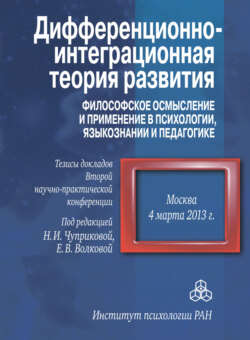Читать книгу Дифференционно-интеграционная теория развития. Философское осмысление и применение в психологии, языкознании и педагогике. Тезисы докладов Второй научно-практической конференции. 4 марта 2013 г., Москва - Коллектив авторов, Ю. Д. Земенков, Koostaja: Ajakiri New Scientist - Страница 7
I. A. Khvatov (Moscow University for the Humanities), A. N. Kharitonov (Institute of Psychology, Russian Academy of Sciences)
A new approach to the problem of origin and phylogenetic development of mind[2]
ОглавлениеThe authors elaborate the idea of the existence of mind in every living system. In most organisms (prokaryotes, fungi and plants) mentality makes a homogeneous unity with the physiology of the body and provides orientation of organisms, or colonies of microorganisms within their own system. In the course of phylogeny a gradual differentiation of mental processes from the physiological ones occurs. At a certain stage in the evolution of a particular group of living systems a specific form of life activity, i. e. the behavior, emerges which is associated with holozoic nutrition and an active movement. In this group of living systems, that further gave rise to an independent kingdom, the animals, the evolution of mind is associated with regulation of activities, thus ensuring not only orientation in the internal medium of the body, but also in the external environment. The evolution of this kind of mentality is further propelled by differentiation and integration of form and content of mental images. However, this process is characterized by qualitative specificity in different taxa of animals manifested in three main directions of the evolution of mind: aromorphosis, idioadaptation and degeneration.
